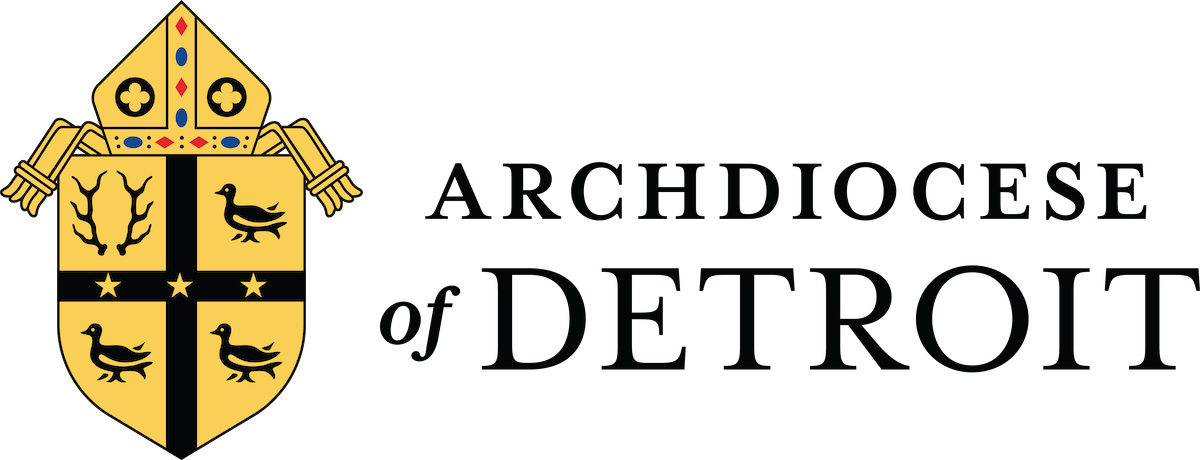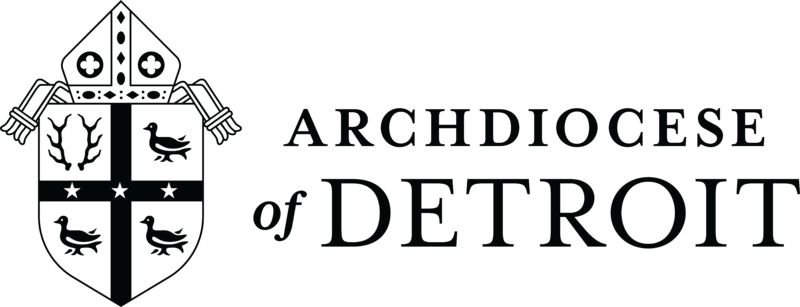Homily of Archbishop Allen Vigneron at the Mass with the Sistine Chapel Choir
The following is Archbishop Allen Vigneron's homily at Mass with Sistine Chapel Choir on September 24, 2017 at the Cathedral of the Most Blessed Sacrament.
Praised be Jesus Christ. Now and forever.
Si è laudato Gesùcristo. Sempre si è laudato.
Again, on behalf of all of us, I want to be sure that you understand, Maestro and all the members of the Capella, how grateful we are for your presence today.
The, perhaps, most striking part of the parable appointed for our hearing today is the punchline at the end – the idea that if you work one hour you’re going to get paid the same thing as people that start at 6:00 in the morning. We share the shock, I believe, of the people themselves who were the first hired, and that shock is all the more underscored by the selection of the Old Testament reading from Isaiah which talks about how God’s ways are not our ways.
As I was reflecting on the reading I thought, “Could there be a city in which people are all the more shocked than we are where we’ve got the UAW and the Teamsters and the AFL/CIO. Most of us here come from union families in one way or another, so Jesus captures our attention by the way He ends this parable. And that’s His purpose. Parables are meant to provoke us because they’re about the kingdom of God and the kingdom of God is not like other kingdoms and so we don’t understand it the way we do other kingdoms and realities.
I’d like to propose for our consideration of the parable today, our common reflection on this parable Jesus tells, that we start with the landowner because I think, if we can understand better the kind of character he is – who he is – I believe we will understand the rest of the parable all the better. And I also think it will help you understand how I find in the parable a confirmation of our efforts at the New Evangelization, our efforts to unleash the Gospel.
So, the landowner. I don’t want to pretend I’m putting on airs in front of our distinguished guests, but I am going to tell you that I don’t think the translation is very good. To describe this leader as a landowner doesn’t do justice to the great word that’s in St. Matthew – oikodespotes – the one who runs the household. Householder might be good. The Latin is pater familias. I think a very good translation for this guy who’s managing the whole operation is small business owner. Small farmer. That’s the kind of character Jesus is talking about. And you’ll notice that he’s got all kinds of energy – just what you might expect in a man who’s running his own family farm. After he goes out and hires the first people in the morning, he doesn’t go back home to have eggs and bacon and watch Oprah on television. He’s out there five times, trying to recruit workers for his vineyard. You listen to the parable as he speaks to those he finds in the marketplace, the day laborer station, we might say. And he’s almost pained each time he goes to them “What are you doing here? I’ve got stuff for you to do! I care about my vineyard!” It’s clearly personal for this man.
So, really, this oikodespotes, this small farmer, is really a type for Jesus Christ. The vineyard is the church – that’s a very common metaphor for the Church in Sacred Scripture. And so we understand why this character takes it so personally and is so engaged trying to build up the operation: because this is what the Father sent Jesus to do. This is why He was born, this is why He came into the world, was to transform what used to be Eden and then became the desert, back into a paradise – the vineyard of His father.
Then we can understand who the workers are. They’re people who are invited by Jesus to share His mission, to work alongside of Him, to be engaged as He said one time to the disciples, “As the Father has sent me, I send you.” I was sent into the vineyard and now I send you into the vineyard – whether you come at 6:00 in the morning or noon or 5:00 in the afternoon. You see why He’s so aggressive? Because there’s more work than one man can ever do to build up the kingdom of God.
With all of that said, then, we understand why Jesus points out that the rewards are incommensurate with the labor, because there’s no fit measure ever between bringing people into the kingdom of God and letting them know about God’s love and mercy and money or recompense, as the world judges recompense. It’s because of the very nature of the enterprise that the usual measures of justice are not denied, but they’re exploded beyond human expectation.
How do we apply this parable to ourselves? As I mentioned, I think it gives us great confirmation of our efforts to unleash the Gospel because we see that we too are ardently desired by Jesus Christ to go out into the vineyard and work toward building it up. Whether we come at this early or late, God wants us out there, God wants us engaged. As it is so brilliantly put in my pastoral letter: there are no bystanders. The master, the landowner, the small business guy, doesn’t want any bystanders in the marketplace. Nobody’s on the bench, everybody has to contribute.
I think that our brothers in the Capella Sistina give us a great example of this service of the kingdom of God. See, their being here, as Msgr. Palombella has said so many times, is not simply an aesthetic or cultural event; they’re here on a mission to evangelize. They’re in the vineyard. They are witnessing to the beauty of the mystery of faith by making beautiful the presence of that mystery in the sacred liturgy. That’s their mission. That’s why they left all the good food and the comforts of Rome to be here in our city. Coney dogs are good but they’re not as good as spaghetti alla corbonara.
But they’re here for this mission. To help explain it, if I might take the time to quote Pope Benedict XVI, who affirmed the relationship between sacred song and the new evangelization, “Vatican II’s constitution on the liturgy,” the pope says, “recalls the importance of sacred music in the mission ad gentes. Even in countries of ancient evangelization, such as Italy, sacred music with its own great tradition – which is our western tradition – can have and indeed has, an important task to encourage the rediscovery of God as well as a renewed approach to the Christian message and to the mysteries of the faith.” This is the mission because of the talent God gave them that they have taken up – to draw people to Christ by showing people Christ’s beauty.
As I was thinking about this little axiom that I formulated, what occurred to me last night when the choir sang the setting of Adoramus te Christe, We adore you, O Christ, and we bless you because by your holy cross you have redeemed the world, we have a very poignant presentation of the point I’m trying to make, because to the natural mind, crucifixion is an ugly, brutal reality from which any ordinary human being would want to shield his or her face. But by the artistry of the composer and the artistry of the choir, what might have been looked at as ugly is now presented in its beauty, the beauty of Christ in His self-giving. That’s one example, a way to understand what their mission is.
And in understanding the choir’s evangelical mission, we are called to think again about our mission, the one each of us has. See, we’re not simply recipients of their evangelizing service; their presence here is an impetus for us, to each of us to look at his or her life and say “What’s my talent? What can I contribute? Where do I need to go in the vineyard? Is it my job to prune? Is it my job to weed? Is it my job to hoe? To harvest?” but we all must be engaged in the work of letting the world see how beautiful Christ is because that’s what the landowner wants. That’s why he’s so aggressive, because he wants everybody to have his father and his father’s love. And, they also give us an example that as we go about our work of evangelization, we should do it beautifully. It shouldn’t be ugly. It should have the light and brightness of the very face of Jesus Christ.
So, let us then proceed to offer the Holy Sacrifice. Let us understand that whether you come to this operation early or late, we all get the same reward. We get to eat the body of Jesus Christ and drink his blood. A reward that is beyond all reckoning. And, as we receive the reward let us be renewed in our commitment to work for the rest of our days so that others may come to know what we know, that in the Passover of Jesus Christ all things are secure and made new, and what might have been thought ugly is transformed into beauty – the beauty of our self-giving united to the self-giving, the sacrifice, of Jesus Christ.
We adore you, O Christ and we praise you because by your holy cross you have redeemed the world.
n/a

